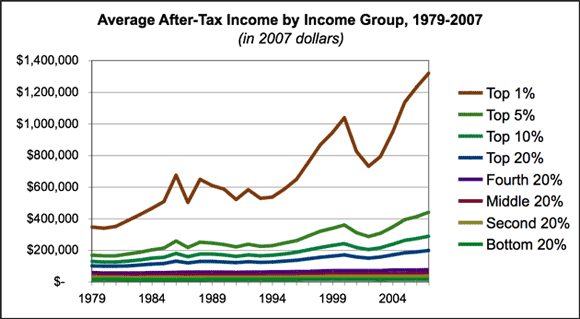There's been a lot of talk this year about income inequality due to Bernie Sanders. He's not the only one though. A book named CAPITAL by Piketty came out a few years ago that sparked the subject again. For the most part these books and politicians demonize a class of people for taking advantage of other people. More specifically the 99% even though as I've previously posted this is a mathematical issue not a societal one. By the way, the 1% is only a family that makes an annual income of $400,000+ a year, not exactly a Rothschild or a Rockefeller. A lot of money, but nothing crazy for a mid level execute who is married to a doctor/lawyer to achieve, especially if you live in a large city like NYC.
So how do you change it or eliminate it? As it turns out you have the ability and all of the power in this relationship. You are actually the ones who make the 1% rich. People become rich because they give money to other people. In our capitalist society this happens for the most part willfully. In kleptocracies or dictatorships it happens with force. Becoming ultra rich is the result of scalability. That happens because goods and services are able to be provided though a network rather than individually. What do I mean? I'll show you.
Scalability
Scalability is the ability to do more with less or the same resources. Think tax software vs an individual CPA who would do your taxes. One person owns the software who could do a million tax returns and that person gets millions from doing it. Can an individual CPA earn millions over a tax season. Never. There isn't even time to do it since they charge by the hour. Scalability is everywhere and its growing do more and more to globalization. Assembly lines, industrial farms, mega retail stores and websites, software, international shipping, national home builders, etc. The list goes on and on and on. So how do you get around this?
Be Anti-Scalable
For centuries there has been a phrase among local communities, "Buy with us or go without." Meaning that you need to keep the money in your community or else you don't buy it at all. It has been highly effective at allowing small alienated communities to lift themselves up out of poverty. Look at the Jews throughout history. The Irish in Boston. The different Asian communities all over the USA. You get your car worked on, where food is bought, taxes are done, clothes mended, entertainment, etc. are all done within the community. This allows for the wealth to be spread around while everybody gets richer but also nobody gets extremely rich.
Go without! If you need shit done. Do it locally! If you don't need it, don't do it! You don't need cigarettes. You don't need cable. You don't need new clothes. You don't need processed food. Go to non-franchise restaurants. Go to plays instead of movies. The list is unlimited, it's how everybody used to live.
The Down Side
When something is anti-scalable, it most likely will result in lower economies of scale. What does that mean? It means it's going to cost you more. You can make the argument that in the end it costs you less through better health (food) or less likely to have a financial collapse (local credit unions). I don't disagree with you, it's just very difficult to prove, whereas lower costs now are easier to verify.
The Government Can't Do It
If you wait for the govt to fix this problem you're going to wait forever. Why? It's a function of mathematics. If the average American who makes a good living at $50,000 and has a great savings rate of 20% he's going to grow it at $10,000 a year. Compare that to a billionaire who easily makes $40 million a year. Even with a Karl Marx's tax rate of 90% he's going to take home $4,000,000 a year. Even at the lowest level of being a 1% you can still clear $40,000. So as the math shows the govt can only reduce some income inequality. The only way to majorly eliminate income inequality is to reduce spending. And when you do spend it needs to be local.

 RSS Feed
RSS Feed
